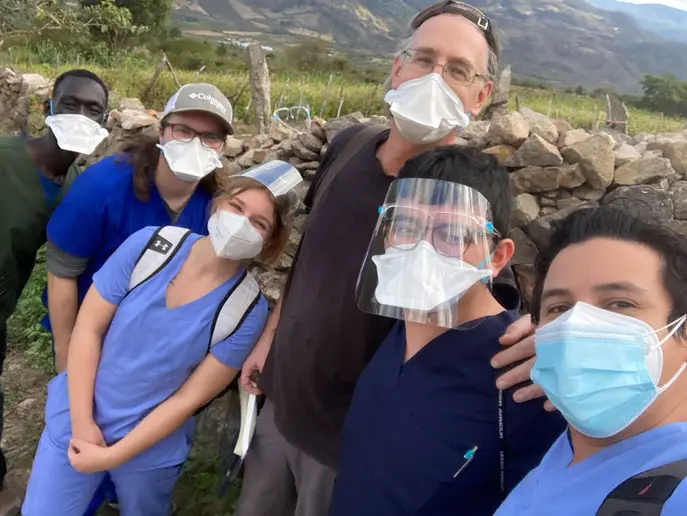Fredonia students were not able to staff medical brigades in Honduras during the semester break, but the university’s connection to the Central American country remains intact even during the coronavirus pandemic, thanks to Department of Biology Department Chair and Professor Ted Lee and four alumni.
The quintet spent a full week in January on brigades that delivered general health care for 1,095 residents living in rural areas in a mere five days, many more than the Fredonia program had served in previous years.
“Because of the pandemic, people were very anxious,” Dr. Lee recalled, “and many of them had not been able to see a doctor since early 2020, so they were anxious to get themselves and their children checked out.” The largest numbers of patients previously seen by a Fredonia contingent, in 2019 and 2020, was below 700.
Serving alongside Lee were four of his former students – Mam Deng, ’18; Jacob Traverse, ‘21; Hailey Gould, ’20; and Christian Pacheco, ’19. The quartet – all Molecular Genetics majors – were joined by five members of a church group from Tacoma, Wash., that had participated in past brigades. Like Lee and the Fredonia alumni, all medical brigade volunteers made their own arrangements to go to Honduras. In addition to providing medical care, the trip also functioned as a guide for developing plans at Fredonia for an anticipated return of students in 2023.
“This was my first brigade but definitely not my last. Hopefully the Fredonia group will be going down for years to come, and one day soon I will be able to help as a physician in these brigades.” - Jacob Traverse, ‘21
Lee indicated he had a great experience working alongside Honduran pharmacist Mirelle Fontecha, dispensing over-the-counter medication and filling prescription orders, so he hopes to include her on a future Fredonia brigade.
Ms. Gould and Mr. Traverse compiled personal patient information and medical histories and also measured vitals such as weight, blood pressure, heart rate and temperature. Patients seen by the pair ranged in age from 3 months to over 90 years, Traverse said.
“What attracted me to the program was hearing the stories of those who went the first year. I'd never been outside of the country and enjoy volunteer work so I thought it'd be a great experience to get out of my comfort zone and expose myself to Honduran life and culture while making a helpful impact in their communities,” Gould explained.
This was Gould’s second medical brigade experience, having also gone in 2020.
The major difference that she observed between the two trips was the isolation from children at Sociedad Amigos de los Ninos, which operates an orphanage. “In 2020, any free time we had was spent playing with the kids but this past year we could only plan a masked short visit with any children or homes we sponsor,” Gould said.
Gould corresponded with children that she met back in 2020; she wrote letters and they sent back drawings and furnished updates of their lives and schooling through letters. “It was so great to visit with them even for just a short time,” she added.
Traverse, seeking to gain perspective on how health care works outside of the U.S. before applying to osteopathic medical schools, marveled at the attitude of patients. “They were all very appreciative and kind to us,” he said. “It was refreshing to interact with patients who were grateful for the service we were providing them.”
Currently working as an emergency room technician at Mount St. Mary’s Hospital in Lewiston, Traverse, who also had minors in Psychology and Chemistry, would like to return to Honduras.
“Seeing how the Honduran physicians interact with their patients and the different needs of these individuals was interesting,” Traverse said. Problems, such as staffing shortages and increasing wait times, that U.S. hospitals experience feel less significant after hearing stories of people walking for miles and standing in line for hours just to see a doctor.
“This was my first brigade but definitely not my last,” Traverse vowed. “Hopefully the Fredonia group will be going down for years to come, and one day soon I will be able to help as a physician in these brigades.”
The major takeaway for Gould was that, no matter where people come from or their circumstances, they are still deserving of basic human rights of health care, housing, clean water and food, clothing and shoes and education.
“While the country does have its own issues, there is a sense of community, togetherness and love that I've never experienced before and continues to bring me back. The kindness, patience, and gratitude we receive from the Honduran people during medical brigades is unmatched and almost unseen in U.S. healthcare settings,” Gould commented.
Time spent in Honduras has genuinely influenced Gould’s career plans. “It helped me realize I want to become a doctor and want to treat those who are often overlooked due to their location, financial status, background and circumstances,” Gould said.
Specifically, she would really love to return to the orphanage and serve as a doctor on medical brigades to help diagnose, prescribe and give the Honduran people the medical attention Gould said they deserve.
Lee reports COVID had certainly had a profound impact in Honduras. “People are getting vaccinated, people want to get vaccinated, and they should be getting shots to children soon.” Tragically, Lee reported that Sr. Maria Rosa, who founded Sociedad Amigos de los Ninos, the organization that operates the orphanage that houses over 100 children, as well as schools and medical clinics, and also hosts Fredonia contingents, had passed away from COVID in late 2020.
Lee was also part of the first American group to serve on a Honduran brigade through their host organization since the pandemic began. That brigade, held last summer, was smaller, staffed by three other volunteers from the U.S., and provided care for chronically ill patients. “We did a trial run to see how things would go,” Lee said.
It’s a goal of Lee that Fredonia students will have the opportunity to serve on medical brigades in Honduras in 2023. If pandemic guidelines remain largely as they are now in 2023, students will have to be fully vaccinated and boosted, Lee said, “and whatever COVID safety protocols are in Honduras, we will follow those to the letter.”
On Lee’s last trip, everyone wore masks, unless they were eating, showering or sleeping. Additional safety measures were also put into place by the host organization for all brigade members.





